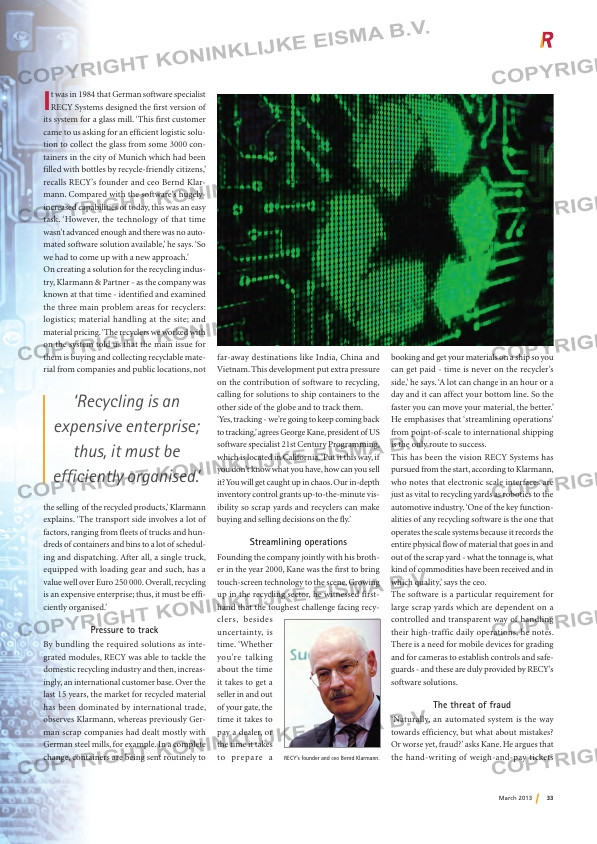Page 33 from: March 2013

33March 2013
in the scrap yard
far-away destinations like India, China and
Vietnam. This development put extra pressure
on the contribution of software to recycling,
calling for solutions to ship containers to the
other side of the globe and to track them.
‘Yes, tracking – we’re going to keep coming back
to tracking,’ agrees George Kane, president of US
software specialist 21st Century Programming,
which is located in California. ‘Put it this way, if
you don’t know what you have, how can you sell
it? You will get caught up in chaos. Our in-depth
inventory control grants up-to-the-minute vis-
ibility so scrap yards and recyclers can make
buying and selling decisions on the fly.’
Streamlining operations
Founding the company jointly with his broth-
er in the year 2000, Kane was the first to bring
touch-screen technology to the scene. Growing
up in the recycling sector, he witnessed first-
hand that the toughest challenge facing recy-
clers, besides
uncertainty, is
time. ‘Whether
you’re talking
about the time
it takes to get a
seller in and out
of your gate, the
time it takes to
pay a dealer, or
the time it takes
to prepare a
booking and get your materials on a ship so you
can get paid – time is never on the recycler’s
side,’ he says. ‘A lot can change in an hour or a
day and it can affect your bottom line. So the
faster you can move your material, the better.’
He emphasises that ‘streamlining operations’
from point-of-scale to international shipping
is the only route to success.
This has been the vision RECY Systems has
pursued from the start, according to Klarmann,
who notes that electronic scale interfaces are
just as vital to recycling yards as robotics to the
automotive industry. ‘One of the key function-
alities of any recycling software is the one that
operates the scale systems because it records the
entire physical flow of material that goes in and
out of the scrap yard – what the tonnage is, what
kind of commodities have been received and in
which quality,’ says the ceo.
The software is a particular requirement for
large scrap yards which are dependent on a
controlled and transparent way of handling
their high-traffic daily operations, he notes.
There is a need for mobile devices for grading
and for cameras to establish controls and safe-
guards – and these are duly provided by RECY’s
software solutions.
The threat of fraud
‘Naturally, an automated system is the way
towards efficiency, but what about mistakes?
Or worse yet, fraud?’ asks Kane. He argues that
the hand-writing of weigh-and-pay tickets
It was in 1984 that German software specialist RECY Systems designed the first version of
its system for a glass mill. ‘This first customer
came to us asking for an efficient logistic solu-
tion to collect the glass from some 3000 con-
tainers in the city of Munich which had been
filled with bottles by recycle-friendly citizens,’
recalls RECY’s founder and ceo Bernd Klar-
mann. Compared with the software’s hugely-
increased capabilities of today, this was an easy
task. ‘However, the technology of that time
wasn’t advanced enough and there was no auto-
mated software solution available,’ he says. ‘So
we had to come up with a new approach.’
On creating a solution for the recycling indus-
try, Klarmann & Partner – as the company was
known at that time – identified and examined
the three main problem areas for recyclers:
logistics; material handling at the site; and
material pricing. ‘The recyclers we worked with
on the system told us that the main issue for
them is buying and collecting recyclable mate-
rial from companies and public locations, not
the selling of the recycled products,’ Klarmann
explains. ‘The transport side involves a lot of
factors, ranging from fleets of trucks and hun-
dreds of containers and bins to a lot of schedul-
ing and dispatching. After all, a single truck,
equipped with loading gear and such, has a
value well over Euro 250 000. Overall, recycling
is an expensive enterprise; thus, it must be effi-
ciently organised.’
Pressure to track
By bundling the required solutions as inte-
grated modules, RECY was able to tackle the
domestic recycling industry and then, increas-
ingly, an international customer base. Over the
last 15 years, the market for recycled material
has been dominated by international trade,
observes Klarmann, whereas previously Ger-
man scrap companies had dealt mostly with
German steel mills, for example. In a complete
change, containers are being sent routinely to
‘Recycling is an
expensive enterprise;
thus, it must be
efficiently organised.’
RECY’s founder and ceo Bernd Klarmann.
RI_2-RI-Software.indd 33 06-03-13 14:38



